Lawn mowers retain grass and debris in the mower deck. So the question you might be asking is if you should clean the mower deck after each use. We have done our research and here is the answer we've determined.
If you have the time, cleaning the mower deck after each use will help prevent grass, dirt, and debris buildup over the long term. Cleaning the mower two or three times during the mowing season can also maintain it in good condition.
If your lawn mower stays dirty for a longer time, the mower deck buildup will become tougher to remove. Keep reading further to learn more about cleaning your lawn mower -we've go the tips and tools you'll need!
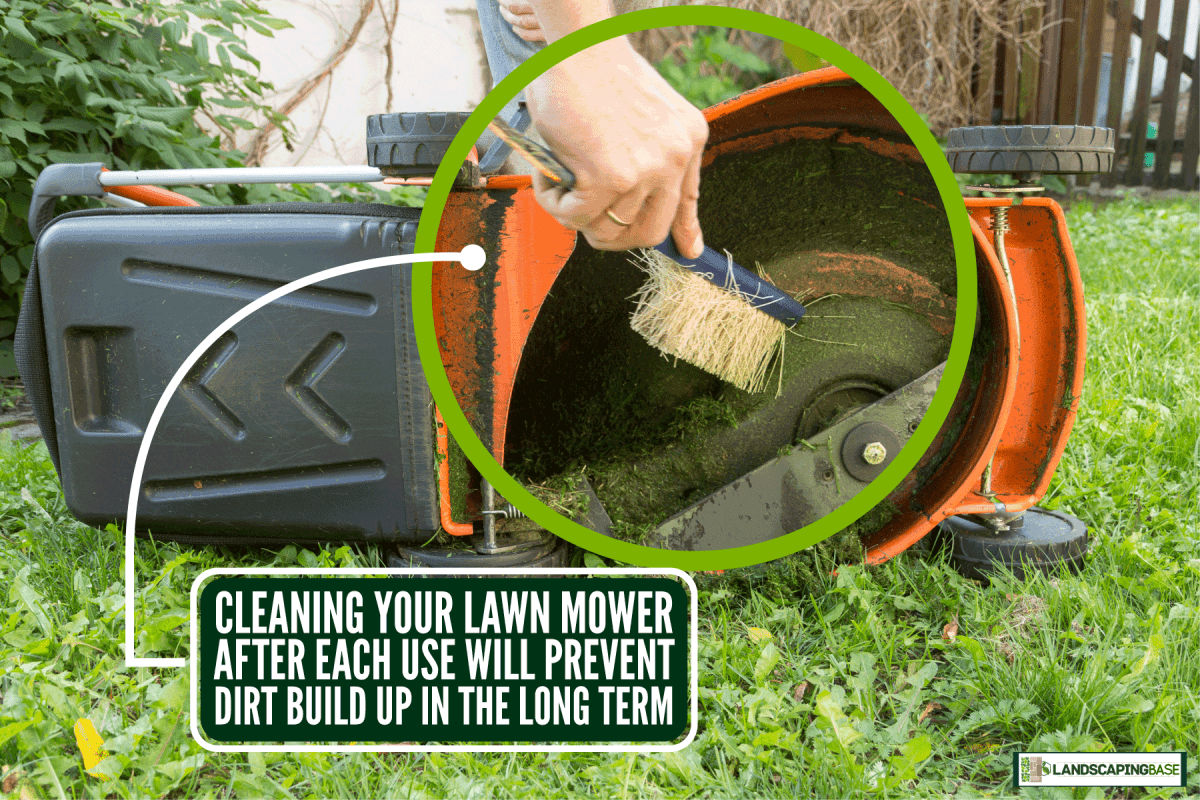
Should I Clean My Lawn Mower After Each Use?
Cleaning your mower after each use is okay as long as you don't spray water on the engine and never use a pressure washer.
Removing clumps of grass clippings and dirt ensures your mower deck won't prematurely rust.
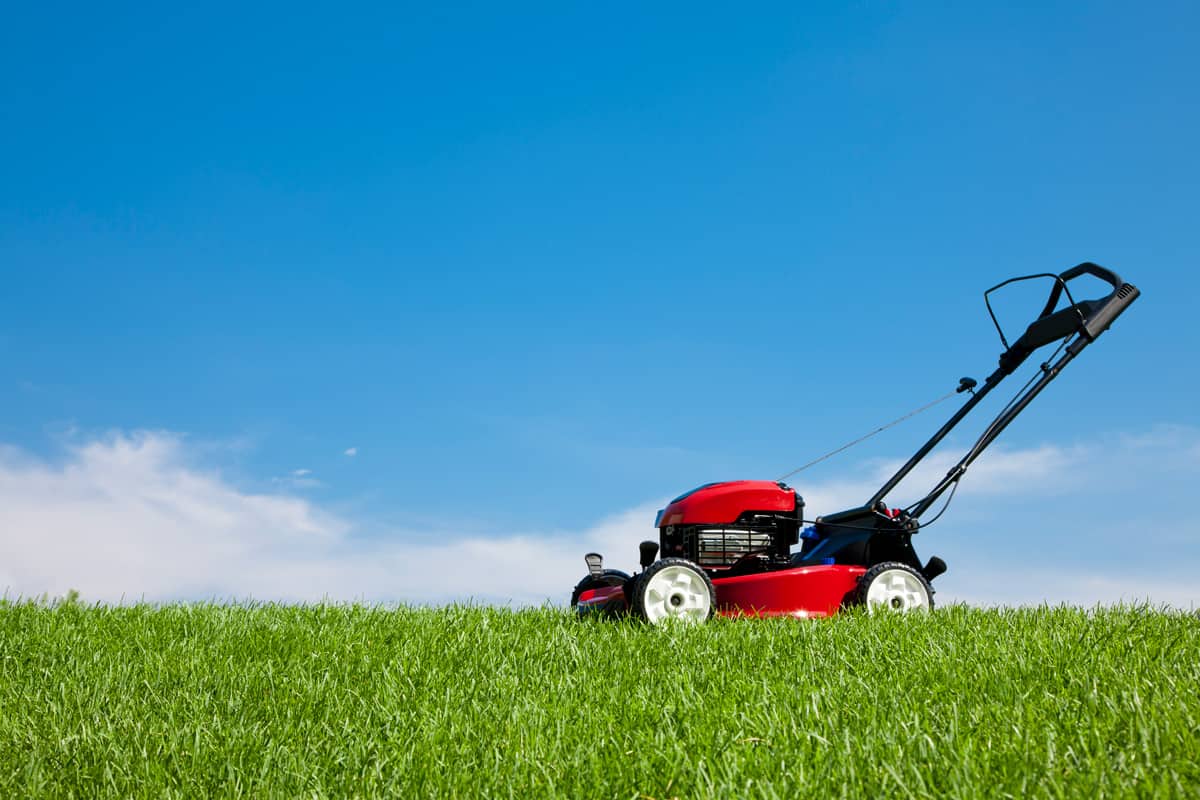
How Do You Clean a Lawn Mower After Each Use?
What you'll need to clean your lawn mower includes durable gloves, a water supply via bucket or hose, an environmentally friendly cleanser, a rag, and a stiff-bristled brush.
Step-by-Step Instructions
- Empty the mower's gas tank. Tilt the machine at a sufficient angle to access underneath the mower deck. Make sure to support the machine, while on its side, using a substantial block or another prop.
- If you have a four stroke lawn mower, lean it so that the spark plug is facing up. For two-stroke models, make sure to also turn off the fuel.
- Remove any chunks of grass or debris that might be wrapped or stuck around the mower's blade. Spray the mower deck with a garden hose.
- If the underside of the mower deck has stuck-on grime, apply a cleaning solution using a stiff-bristled brush. Rinse thoroughly, and set the mower upright to dry.
Why Should I Clean My Mower Deck?
Both your yard and your mower can suffer if the deck becomes caked with cut grass. A clean mower deck is less prone to rust, as moisture cannot get trapped between the dirt and deck.
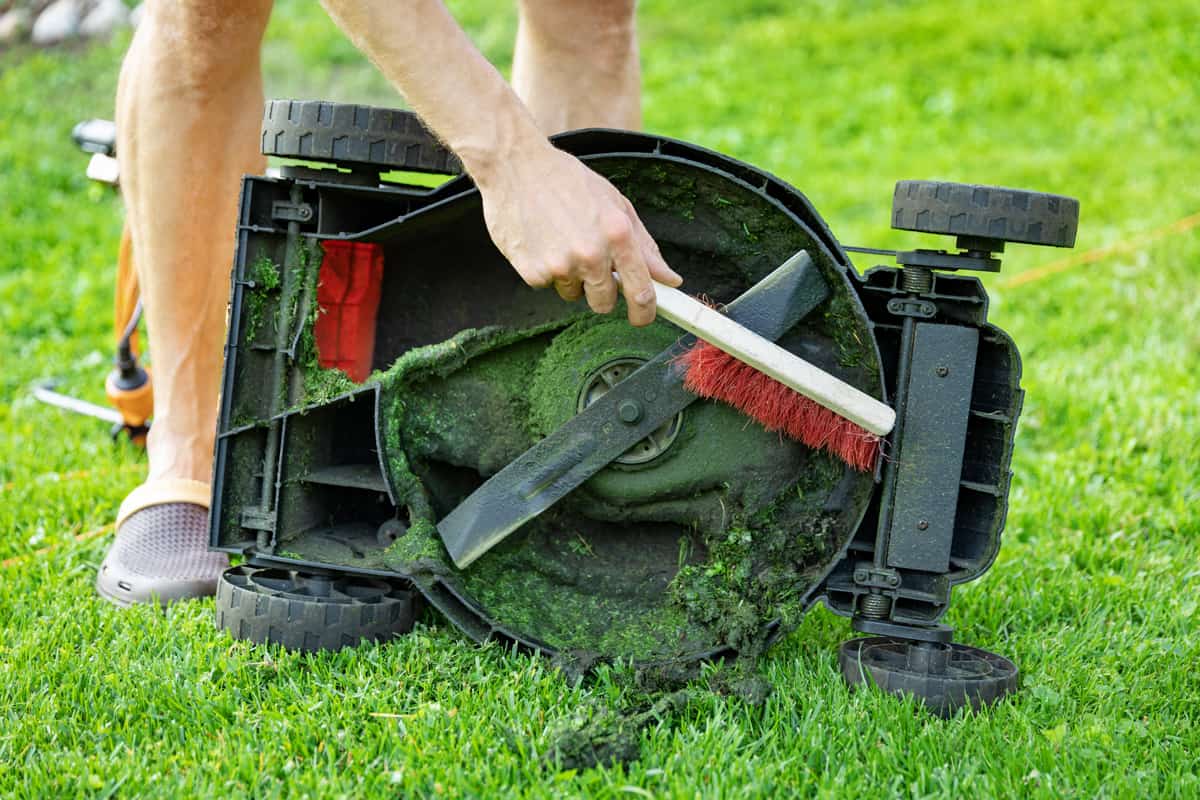
Dirty mower decks can also spread diseases on the lawn, causing unhealthy grass. Additionally, it can dull the blades and unclean cuts leave your grass prone to infection.
Reasons to Clean Your Mower Deck
A clean mower deck is efficient, meaning the blades rotate freely and remain sharp for clean cuts. The mower is less prone to corrode or rust because moisture cannot become trapped between caked on dirt and grass chunks.
When you clean your lawnmower right after mowing your lawn, the grass hasn't had a chance to dry on your mower, making it easier to clean. The more matted grass accumulation there is on a lawn mower, the harder it will be to clean.
Is It Okay to Hose Down a Lawn Mower?
Always read the owner's manual for your lawn mower for recommendations on how to keep the mower deck clean. Most mowers can be hosed clean, or flushed with buckets of fresh water. A mild cleaner might be necessary for really stuck on dirt.
Never use a pressure washer or hose to clean an electric lawnmower. It is more likely that you can damage the wiring or electrical connections with sprayed water on these mowers, whereas on gasoline powered mowers it is fairly easy to protect the engine while only spraying the mower deck.
You might also use a clean cloth or scrub brush to clean the lawn mower's exterior, wheels, and tires. Carefully aim the hose when spray cleaning a lawn mower to avoid saturating the engine, fuel reservoir, or any electrical wiring.
Apply Lubricants
Apply a lubricant similar to what you would use on your wheels. While the bracket inside the wheel and the axle are both composed of metal, the majority of wheels are made of plastic.
Just give each of the four wheels a slight squeeze. You don't need to overdo it. Make sure the components are completely dry before applying lubricant.
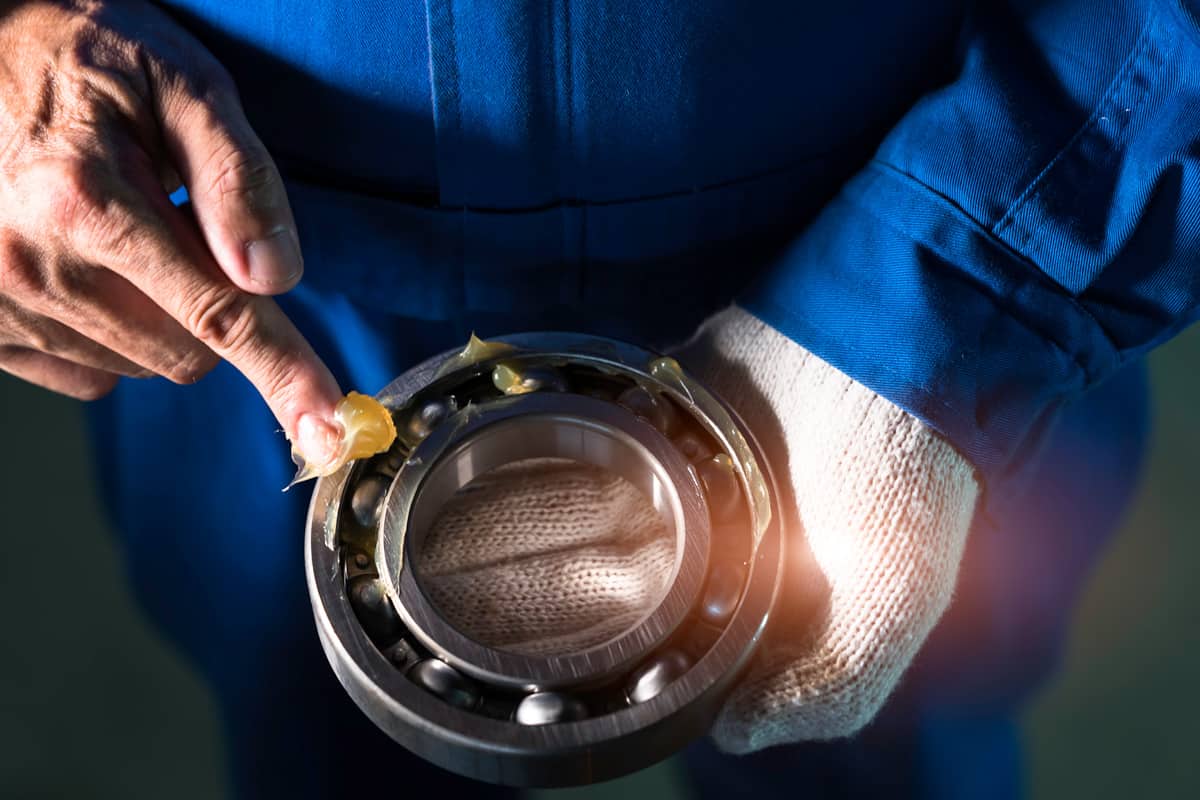
How Do You Keep Grass From Sticking to The Bottom of a Mower Deck?
Routinely cleaning the mower deck is the best way to prevent grass from sticking. Also, avoid mowing when the lawn is wet, as wet grass can more readily get compacted beneath the deck and become difficult to remove.
Spray non-stick cooking spray on the underside. This is an inexpensive, temporary fix that marginally lessens accumulation and makes it simpler to scrape off. Use a clean rag to apply vegetable oil if you don't have a spray.
Similar results can be achieved using WD-40 or old motor oil, but these lubricants can drip off and harm your lawn.
Check out the WD-40 on Amazon.
Applying a graphite, silicone, or Teflon lubricant is another option. You must completely cover the underside of a dry, clean deck before allowing it to dry as instructed on the lubricant label.
Although it should stay longer, the effect is comparable to the cooking spray. This can be sufficient to suit your needs if you are cutting a short, dry lawn. If you have used lubricants in the past and weren't happy with the results, try any rust-prevention product.
Which Way Do You Tip a Lawn Mower?
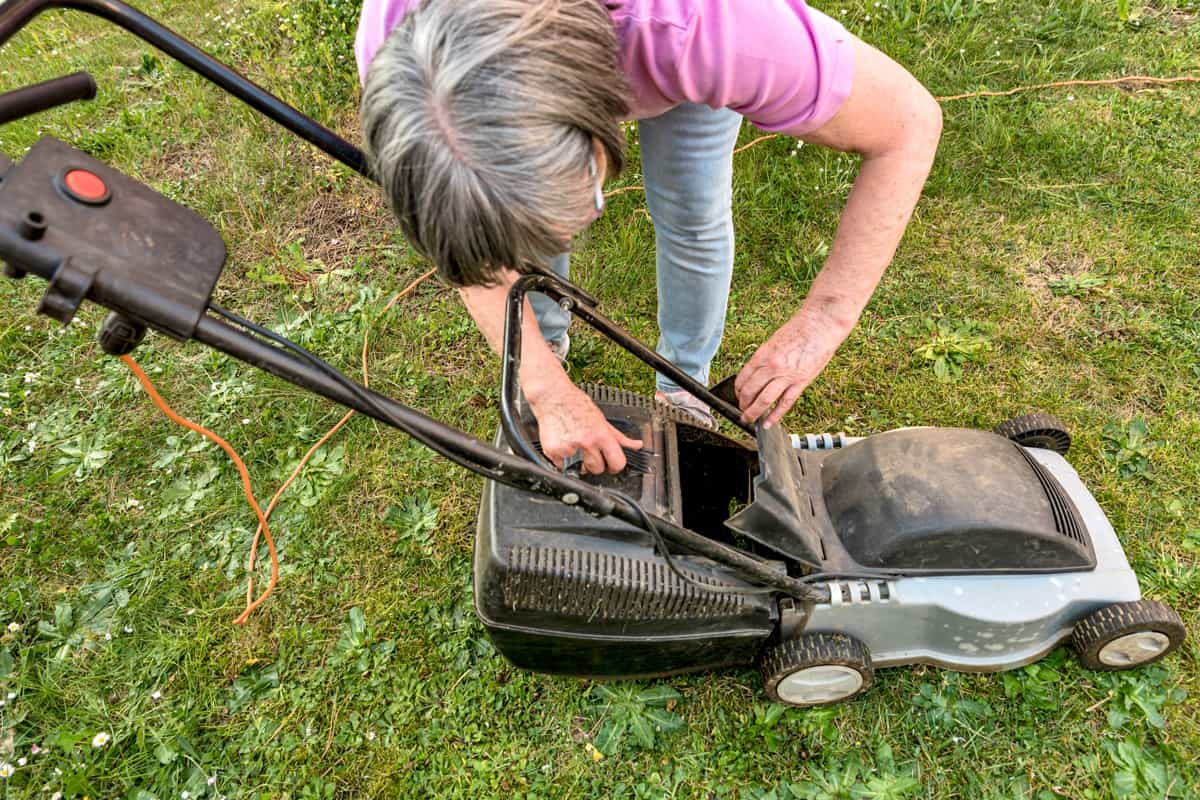
You must tip your mower onto its side to clean the deck and blades, as well as perform other maintenance procedures and install replacement parts.
The best method is utilizing jacks or jack stands to tip a mower back with the front wheels up. A push or riding mower being tipped on its side is risky. Always tilt away from the carburetor if you must attempt it to prevent harm to the internal combustion components.
A push-mower can be tipped in one of two methods, however, both include removing the sparkplug for safety. The front wheels must first be raised by lowering the handle. Next, you can turn the lawnmower away from the carburetor.
- In the first method, the mower is tilted while the front wheels are in the air and the handlebars are on the ground. To hold the handlebars and consequently the mower in position, you can use strong weights or hooks.
- Similar to riding mowers, for the second method, you must choose the side of the carburetor and make sure to tilt the mower toward that side. Once more, this stops oil from dripping into the carburetor and air filter.
Additionally, tilting away from the carburetor will stop oil from getting to the air filter. As a result of the mower's air and oxygen intake being hampered by an oily air filter, combustion and engine cooling will suffer.
To Sum Up
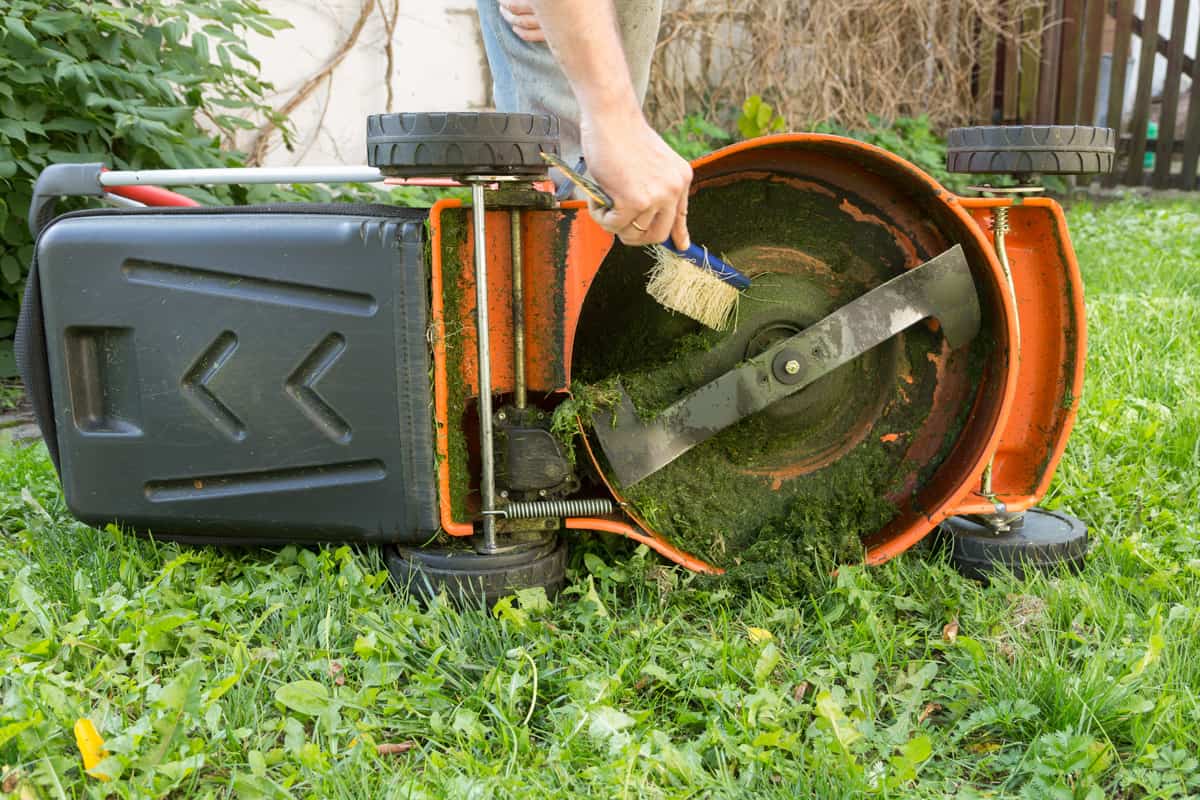
Cleaning your mower is acceptable as long as you don't spray water on the engine and never use a pressure washer. Cleaning the mower after every use is important for cutting efficiency and a well maintained machine.


![A man using a portable vacuum to collect dead leaves, Will A Leaf Vacuum Pick Up Mulch? [Can It Remove Leaves From Mulch?]](https://landscapingbase.com/wp-content/uploads/2022/09/Man-using-a-portable-vacuum-to-collect-dead-leaves-600x400.jpg)

